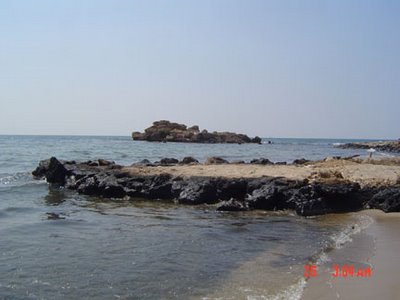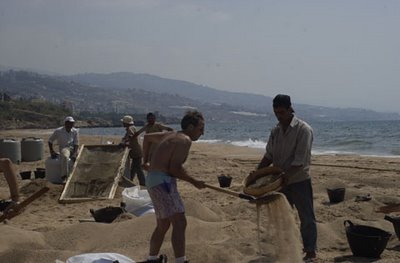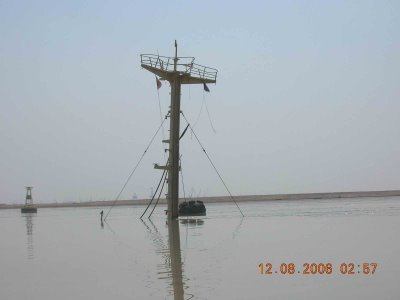In addition to seeing some of the bombing damage in Lebanon, I also went to look at the effects of the Israeli rocket attacks on the Jieh power plant located 30 km south of Beirut, Lebanon on the 13th and 15th of July. The fuel that didn't burn was spilled into the Mediterranean Sea and it was estimated that the resulting spill of fuel was between 10,000 to 15,000 tons. Under the action of wind and currents the slick drifted north and when coming into contact with land, oiling primarily any south-facing beach or harbor. On August 2nd, the oil had reached the Syrian coastline. I was able to speak with a representative of the Lebanese Ministry of Environment while I was in Lebanon on Sunday 27, August. It was more than a month since the spill had occured and the Lebanese, still under Israeli embargo, had not yet been able to do an aerial survey (they were awaiting permission from the Israelis, which was granted the following day). More complete information on the spill can be found on the Ministry Website.

Oiled rocks at Byblos
Aside from the fact that the country was under bombardment, Lebanon was not prepared for an oil spill under any circumstances. I had hoped to find written plans they had made for oil spills and learned that though they did have an emergency response plan on paper it had never been implemented.

Clean-up efforts at Byblos by a local environmental group, Byblos Ecologia.
Environmental groups were ready to jump into the clean-up effort but because of the lack of information and coordination, their efforts were initially discouraged by the Central government (due to their lack of an effective and activated emergency response plan!). By the time I had arrived, clean-up efforts were starting to move forward but the oil had had plenty of time to settle on the beaches and become buried and/or mixed with beach sand.
I was particularly interested in how the Lebanese where handling the oil spill because in our work in southern Iraq. Before traveling to Lebanon, I had heard of another oil spill there in the salt water bay not far from Iraq's southern port city of Um Qasr.
A tanker full of 6500 tons of Iraqi crude oil had struck a previously drowned marine object in the bay on 22 July (nine days after the spill in Lebanon) and had almost completely submerged. It was reported that adverse effect had spread to Kuwaiti waters and birds and fish had been affected.
Below is a photo of this submerged tanker, now a new marine hazard in the bay.

Not much is known about this tanker and it is dangerous to ask too many questions in the area as there are major oil smuggling activities going on.
It should be noted that in addition to approaching the Ministry of Environment in Lebanon about their emergency response plans, I also approached the MoE of Jordan ... I was informed that they have nothing on their books either and are just beginning to sit down and write their own plans.

0 Comments:
Post a Comment
<< Home